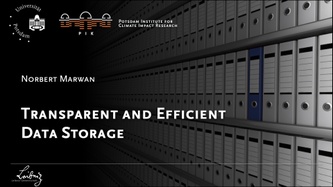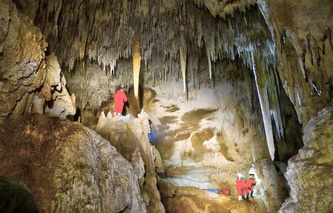We share our experiences and newly acquired knowledge through Master's and PhD courses at the University of Potsdam, including the Institute of Physics and Astronomy, the Institute of Geosciences, and the Institute of Environmental Sciences and Geography. A regular lecture series in the winter semester focuses on Nonlinear Data Analysis Concepts, while a block course covers data management.
Nonlinear Data Analysis Concepts

This course introduces the fundamental concepts of nonlinear dynamics and chaos, emphasizing their application in studying complex systems, spatiotemporal data, and nonlinear interrelationships in Earth sciences. It covers methods based on information theory, recurrence properties, and complex networks, demonstrating their potential applications. Additionally, the course introduces the basics of statistical tests and discusses how to design appropriate tests for specific applications.
The course is offered regularly during wintersemesters for Master's students of the Institute of Physics and Astronomy, the Institute of Geosciences, and the Institute of Environmental Sciences and Geography at the University of Potsdam. PhD students are also warmly welcome!
More information: Course web site at University of Potsdam (login required).
Transparent and Efficient Data Storage for Geoscientists

This block course is designed mainly for PhD students seeking to develop foundational skills in modern data management. The course introduces key concepts, challenges, and best practices for handling research data in a way that ensures transparency, reproducibility, and accessibility. Participants will learn how to document data sources, processing workflows, and results in a clear, structured, and reproducible manner, enabling seamless collaboration and verification within the scientific community. Through a combination of theoretical insights and practical hands-on sessions, students will gain the tools to integrate their research projects into a reproducible and dynamically linked framework.
The course emphasizes best practices for obtaining, documenting, storing, and sharing data – including source code, analysis protocols, raw datasets, and processed files – using modern tools and platforms like GitHub and RPubs. By the end of the course, participants will have the skills to manage their research data effectively, ensuring it is easily transferable and adaptable for future projects or collaborations.
Caves as Scientific Archives
 Caves are invaluable natural archives, offering unique insights into Earth's dynamics and history. This lecture highlights their geological and hydrological properties, showcasing their role in recording climate change, tectonic activity, geomagnetic variability, hydrology, and development of human culture. By emphasizing the multidisciplinary nature of cave research, the lecture underscores its importance in understanding Earth's past, present, and future.
Caves are invaluable natural archives, offering unique insights into Earth's dynamics and history. This lecture highlights their geological and hydrological properties, showcasing their role in recording climate change, tectonic activity, geomagnetic variability, hydrology, and development of human culture. By emphasizing the multidisciplinary nature of cave research, the lecture underscores its importance in understanding Earth's past, present, and future.





